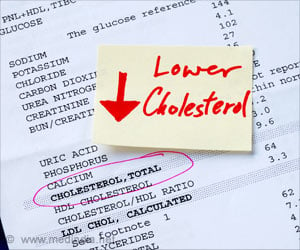Disturbances in the cholesterol metabolism, that is, its conversion into bile acids (called cholesterol catabolism) may play a role in the development of dementia, as per a study at the
National Institute on Aging, part of the
National Institutes of Health, in
Baltimore, Maryland, published in the open-access journal
PLOS Medicine.
The brain consists of a complex yet physiological barrier of blood vessels –
blood-brain barrier (BBB) that is responsible for the selective passage of molecules in and out of the brain. Although the blood-brain barrier is impermeable to cholesterol, high blood cholesterol is associated with an increased risk of Alzheimer's disease and vascular dementia.
‘Changes in how cholesterol breaks down in the body may accelerate the progression of dementia. This suggests that some cholesterol medications may impact signaling pathways in the brain, particularly in men.’
However, the underlying mechanisms of high blood cholesterol that may lead to an increased risk of Alzheimer's and dementia are poorly understood. And the discovery of this may help in discovering effective therapeutics.
The study team recruited more than 1800 participants from two prospective studies:
the Baltimore Longitudinal Study of Aging (BLSA) and the
Alzheimer's Disease Neuroimaging Initiative (ADNI) to investigate whether
abnormalities in cholesterol catabolism through its conversion to bile acids is associated with development of dementia.
Cholesterol Metabolism & Risk of Dementia
The team also examined whether
exposure to cholesterol medications that block bile acid absorption into the bloodstream was associated with an increased risk of dementia among more than 26,000 patients from general practice clinics in the
United Kingdom.
Also the
altered levels of bile acids in the brains of people with Alzheimer's disease were examined via 29 autopsy samples from the
BLSA. Advertisement
It was found that the
risk of vascular dementia increased for males, but not females, with a greater number of prescriptions of bile acid-blocking drugs. This suggests that cholesterol catabolism and bile acid synthesis may impact dementia progression through
sex-specific effects on brain signaling pathways.
However, further analysis is required to better understand the role of cholesterol breakdown in dementia.
Advertisement
"To further extend these findings, we are now testing whether approved drugs for other diseases that may correct bile acid signaling abnormalities in the brain could be novel treatments for Alzheimer's disease and related dementias. These analyses are being pursued in the Drug Repurposing for Effective Alzheimer's Medicines (DREAM) study," says senior author Madhav Thambisetty, M.D., Ph.D., investigator and chief of the Unit of Clinical and Translational Neuroscience in the NIA's Laboratory of Behavioral Neuroscience.
Source-Medindia















